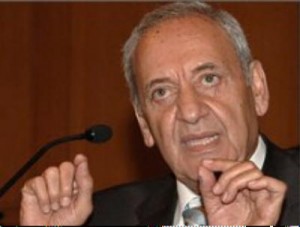 Lebanon Speaker Nabih Berri told An-Nahar newspaper in remarks published on Monday that he will support any electoral law that the Lebanese Christian community decides to adopt.
Lebanon Speaker Nabih Berri told An-Nahar newspaper in remarks published on Monday that he will support any electoral law that the Lebanese Christian community decides to adopt.
“If the Christian community approves an electoral law, I will support their law ,” Berri said adding that he will stand behind the proposal even if he disagrees with it.
In other remarks published in As-Safir daily, Berri said that he refuses to give parliament an ultimatum to approve an electoral law.
“It is not acceptable to force on the parliament such a deadline,” he stressed.
On the other hand Ali Hamdan, Head of the Foreign Affairs Bureau of Lebanon’s Amal Party which is headed by the Speaker told the The Daily Star newspaper that Berri would only vote in favor of the Orthodox Gathering proposal submitted to Parliament by the Free Patriotic Movement, if the joint parliament committees agreed to adopt it.
Berri said that some Lebanese parties wanted the electoral law for the upcoming parliamentary elections to “secure enough seats for themselves not only to choose the president but also the speaker and the prime minister.”
Lebanon’s Cabinet approved earlier in August a new electoral draft law that called for proportional representation and divided the country into 13 districts.
Lebanon was divided into the following electoral districts:
Beirut 2, south Lebanon 2, Bekaa 3, north Lebanon 3 , Mount Lebanon 3.
The new electoral law was approved by the majority of ministers, including the FPM ministers . The ministers that represent Progressive Socialist Party leader MP Walid Jumblatt’s bloc voted against it.
MP Alain Aoun along with FPM MP Neemtallah Abi Nasr also submitted another draft electoral law . This is the so called “Greek Orthodox gathering proposal” which calls on each sect in Lebanon to vote only for its candidate in the elections based on proportional representation and one electoral district for the whole country .
March 14 Christian MPs Georges Adwan, Boutros Harb and Sami Gemayel submitted a draft electoral law based on 50 districts and winner take all majority to the Parliament’s General Secretariat on Thursday morning, according to LBCI.
Jumblatt and his PSP MPs favor the current 1960 electoral law.
“If there was no new election law, there is the one currently present and we can hold polls based on it,” Public Works and Transportation Minister Ghazi Aridi, a key member of Jumblatt’s parliamentary bloc, said last Thursday in response to the draft proposal submitted by March 14 Christian MPs
The Joint Parliamentary Committees held a meeting on Thursday to discuss the c-based electoral draft law ratified by the cabinet, in addition to other electoral law proposals submitted by the parliamentary blocs.
According to observers it does not appear the Christian community as a whole will decide on one draft electoral law. While the March 14 Christian opposition leaders want smaller electoral districts that guarantee to them that their Christian MPs will be elected by their constituencies , MP Michel Aoun a close ally of Hezbollah prefers larger electoral districts and proportional representation because he could count on the Shiite vote to gain a maximum number of seats in the 2013 election. The observers are of the opinion that FPM presented the so called “Greek Orthodox gathering proposal” just as another option knowing it will not be approved by the Joint Parliamentary Committees.
The same observers strongly believe that while Hezbollah and its allies will benefit from proportional representation ( in Christian , Sunni and Druze dominated areas) , March 14 opposition and Jumblatt will be at a disadvantage if proportional representation is adopted , because the overwhelming majority of the Shiites vote for the candidates supported by Hezbollah and Amal.

Leave a Reply
You must be logged in to post a comment.